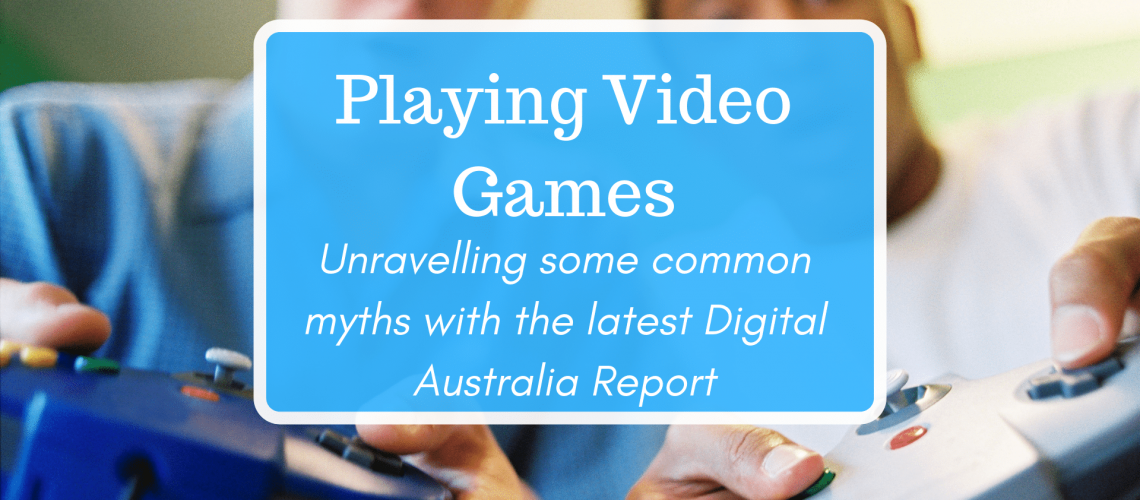The Interactive and Gaming Network (IGEA) have once again released a report of their research findings on how, why and by whom, video games are played in Australia. Undertaken in conjunction with Bond University and comprising a study of over 3000 individuals, it is important work to help us break down some of the pre existing beliefs and common myths and misconceptions about game playing, whilst also looking at how we can harness the power of games for positive outcomes.
You can read the full report on the IGEA website here, but for those who sometimes struggle to understand why their kids seem somewhat obsessed with video games or struggle to comprehend that there can be anything good to come from them, I have taken a look at some of the major findings below to help you garner some new perspective and open our minds to challenge some of our beliefs about the social, emotional, physical and cognitive effects of playing video games.
Here are some of the comments I have heard or seen in the past……..
Video games are for teenage boys holed up in their bedroom who rarely coming out into the light
- 78% of game players are aged over 18
- 34 years of age is the average age of a gamer
- 47% of all players are female
- 42% of those aged over 65 play video games
It’s a pastime that lacks imagination or creativity
- 60% of games are said to promote student creativity
- 27% create and post gameplay videos
- 28% have participated in cosplay, a form of entertainment & socialisation using costume and fancy dress to take on a particular character ….think ComicCon.
It is wasting valuable time that should be spent learning or participating in other activities
- 61% of parents believe gaming can be an effective tool for learning about STEM
- 53% of parents believe games give students greater confidence at school
- 29% have used video games for new skills training at work
- 61% say video games can be motivating for people to try and get fit
- 84% say games help with their general knowledge
Gaming is for loners and those who don’t want to socialise
- 31% attend live gaming events
- 38% enjoy the culture of esports
- 43% of parents play online games with their children
- Only 17% of gamers play alone all of the time
There is no future for a gamer child
- In 2018 total retail industry sales for video games were $4.03 billion ($2.85 billion digital sales and $1.18 billion physical sales). Many will grow up to work and profit from this industry.
Games can be damaging for mental health and wellbeing.
- 73% say games improve their life satisfaction
- 58% say games help manage pain
- The top 5 reasons for playing games were:
- Have fun
- De-stress
- Pass the time,
- Keep mind active
- Be challenged.
- The Top 3 reasons parents play with children:
- Family fun
- The children ask them to
- A way to spend time together
Now of course there does exist the teenage boy holed up playing games in their room, rarely coming out for air. There are people playing games that offer no stimulation, challenge or input into their wellbeing. There are games that lack imagination and creativity. There are plenty of dodgy people ready to take advantage of younger gamers and plenty of people willing to bully and harass. There are female players who pretend they are male to avoid those more misogynistic elements of some gaming circles. There can be times that gaming can interfere with study, work, socialising, sleeping, eating and can affect relationships.
But when we look at the statistics, we are reminded that these are usually the minority. We must also be reminded that we as parents still need to work hard to ensure our child is not in that minority. We need to help them maintain control of their gaming. To help them manage to fit in all the other things they need to fit in. To help ensure they remain active. To help give them the skills to recognise behaviours in others that they must not put up with. To give them the skills to block and report people and set up their games safely. We also want our kids to know we have some grasp of the gaming world, so that we are in the best position to teach them the skills and thinking and behaviours they will need. Because we have a far better chance of our boundaries and rules being respected if they think we are coming from a place of knowledge and understanding.
Once again finding out the facts, having the conversations with your kids and focusing on that all important connection you have with them….will help put you in the best position to help them navigate gaming, devices and the online world.

